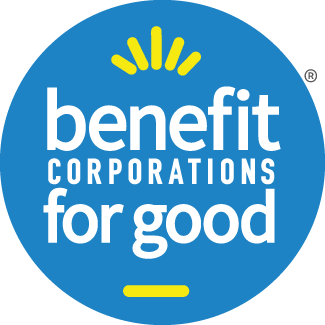How a Mission-Driven Firm Supporting Dramatists Earned its Curtain Call
Deborah Murad, executive director of DG Copyright Management, believes in and practices the Triple Bottom Line of People, Planet and Profit as public benefit corporation in New York City.
DG Copyright Management or DG©M is a purpose-driven business. It believes in doing work that makes a difference in the world. And it’s the very reason why this estate planning consultancy and intellectual property management organization chose to adopt a triple bottom line of People, Planet and Profit.
As a certified Benefit Corporation for Good, DG©M is committed to social and environmental impact. It joins a family of businesses from 5 states and 1 Canadian province whose values are aligned in creating a better business, a better community and a better planet.
We recently interviewed Deborah Murad, executive director of DG©M about becoming a certified Benefit Corporation for Good. Here’s what she had to say about it, her firm’s motivation for doing it and why it’s helping DG©M take a leading role in working with dramatists and their works.
1. What motivated you to become a Benefit Corporation?
We were motivated to become a benefit corporation because we wanted to offer management services that valued authorial intent over profits. When someone leaves us a property, they are trusting us to protect that work for the full term of its copyright and maximize its value. However, more than that, they are trusting our promise to uphold their authorial intent and leave the difficult authorial decisions to the Dramatists Guild Council (60+ of the top playwrights, lyricists, composers, and librettists of the time). They want to know that fellow dramatists are guiding the future of their work and that profits aren’t the only consideration. They want to know that we are prepared to say “no” to a deal that would undermine their wishes.
2. Was it difficult getting internal support for moving toward this model?
It really wasn’t. Our entire model was based upon valuing authorial intent over profits. Becoming a benefit corporation simply made the most sense.
3. How long did it take you to officially become a Benefit Corporation?
I’m not entirely sure about this as I wasn’t there at the time. What I can say is the certification process (while a commitment) was made very easy with the help of Kim from Mighty Epiphyte Consulting.
4. Have you seen any change in culture since you became a Benefit Corporation?
Indeed. While we were initially motivated by the desire to uphold authorial intent, we also always wanted to be a resource for dramatists who were looking to establish an estate plan. As we learned more about what it meant to be a public benefit corporation, we really leaned into the promise to leave the world a little better than you found it.
We’ve thought a lot about what our catalog should look like, how our office should operate, and how we should interact with our community in light of the fact that we are a public benefit corporation.
5. Have you experienced any positive outcomes since becoming a Benefit Corporation?
We have grown our services substantially to offer free programming and resources to dramatists all over the country. This past year we hosted 8 panels on estate and legacy planning in honor of National Estate Planning Week. All of those discussions were open to the public and will remain accessible on our YouTube page. This year, we hope to release a tool kit for dramatists looking to establish a plan for their work.
I don’t think we would have this level of commitment to providing resources to the dramatist community if it weren’t for being a public benefit corporation.
6. Would you recommend this business model to others? Why or why not?
I think it’s a wonderful business model. However, it is a responsibility. I would simply tell anyone considering this model to be prepared for that responsibility!
7. What is the most important trait to have as a conscientious leader of a Benefit Corporation?
I would say that one of the most important traits for a leader of a public benefit company is the ability to question oneself and ones decision-making.
8. What lessons have you learned in the process?
When you’re a public benefit corporation, not everyone will understand why you do what you do. The efforts made for the public benefit, may not benefit the company financially and that is sometimes difficult to explain. I’ve learned to unapologetically stand firm in our beliefs.
9. Is being a Benefit Corporation part of your current brand message?
It is part of what we talk about when pitching our program. Without being a public benefit corporation, we couldn’t do the work we are doing on behalf of dramatists.
10. What is the single best reason you'd give for another company or peer to become a Benefit Corporation?
It’s a moral compass and is a constant reminder of your core values.
You can learn more about DG Copyright Management here.
If you want to know more about why your business should become a benefit corporation, go here.
Learn more about the 6 simple steps to becoming a benefit corporation here.
~benefitcorporationsforgood.com~

